Related Research Articles

York University, also known as YorkU or simply YU, is a public research university in Toronto, Ontario, Canada. It is Canada's third-largest university, and it has approximately 55,700 students, 7,000 faculty and staff, and over 325,000 alumni worldwide. It has 11 faculties, including the Faculty of Liberal Arts and Professional Studies, Faculty of Science, Lassonde School of Engineering, Schulich School of Business, Osgoode Hall Law School, Glendon College, Faculty of Education, Faculty of Health, Faculty of Environmental and Urban Change, Faculty of Graduate Studies, School of the Arts, Media, Performance and Design, and 28 research centres.

The Rhenish Friedrich Wilhelm University of Bonn is a public research university located in Bonn, North Rhine-Westphalia, Germany. It was founded in its present form as the Rhein-Universität on 18 October 1818 by Frederick William III, as the linear successor of the Kurkölnische Akademie Bonn which was founded in 1777. The University of Bonn offers many undergraduate and graduate programs in a range of subjects and has 544 professors. The University of Bonn is a member of the German U15 association of major research-intensive universities in Germany and has the title of "University of Excellence" under the German Universities Excellence Initiative; it is consistently ranked amongst the best German universities in the world rankings and is one of the most research intensive universities in Germany.
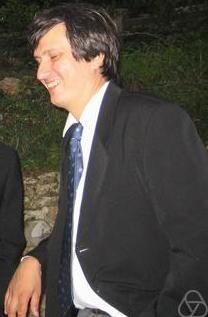
Maxim Lvovich Kontsevich is a Russian and French mathematician and mathematical physicist. He is a professor at the Institut des Hautes Études Scientifiques and a distinguished professor at the University of Miami. He received the Henri Poincaré Prize in 1997, the Fields Medal in 1998, the Crafoord Prize in 2008, the Shaw Prize and Fundamental Physics Prize in 2012, and the Breakthrough Prize in Mathematics in 2014.

The Max Planck Society for the Advancement of Science is a formally independent non-governmental and non-profit association of German research institutes. Founded in 1911 as the Kaiser Wilhelm Society, it was renamed to the Max Planck Society in 1948 in honor of its former president, theoretical physicist Max Planck. The society is funded by the federal and state governments of Germany.

The Max Planck Institute for Astrophysics (MPA) is a research institute located in Garching, just north of Munich, Bavaria, Germany. It is one of many scientific research institutes belonging to the Max Planck Society.
The Max Planck Institute for Extraterrestrial Physics is a Max Planck Institute, located in Garching, near Munich, Germany. In 1991 the Max Planck Institute for Physics and Astrophysics split up into the Max Planck Institute for Extraterrestrial Physics, the Max Planck Institute for Physics and the Max Planck Institute for Astrophysics. The Max Planck Institute for Extraterrestrial Physics was founded as sub-institute in 1963. The scientific activities of the institute are mostly devoted to astrophysics with telescopes orbiting in space. A large amount of the resources are spent for studying black holes in the galaxy and in the remote universe.
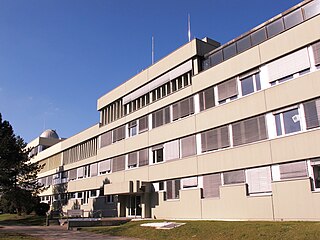
The Max Planck Institute for Radio Astronomy (MPIfRA) (German: Max-Planck-Institut für Radioastronomie) is located in Bonn, Germany. It is one of 80 institutes in the Max Planck Society (German: Max-Planck-Gesellschaft). 50°43′47.6″N7°4′9.2″E

Sami Khan Solanki is director of the Max Planck Institute for Solar System Research (MPS), director of the Sun-Heliosphere Department of MPS, a scientific member of the Max Planck Society, and a Chair of the International Max Planck Research School on Physical Processes in the Solar System and Beyond at the Universities of Braunschweig and Göttingen.

Reinhard Genzel is a German astrophysicist, co-director of the Max Planck Institute for Extraterrestrial Physics, a professor at LMU and an emeritus professor at the University of California, Berkeley. He was awarded the 2020 Nobel Prize in Physics "for the discovery of a supermassive compact object at the centre of our galaxy", which he shared with Andrea Ghez and Roger Penrose. In a 2021 interview given to Federal University of Pará in Brazil, Genzel recalls his journey as a physicist; the influence of his father, Ludwig Genzel; his experiences working with Charles H. Townes; and more.

Andrew Fraknoi is a retired professor of astronomy recognized for his lifetime of work using everyday language to make astronomy more accessible and popular for both students and the general public. In 2017 Fraknoi retired from his position as Chair of the Department of Astronomy at Foothill College. In retirement he continues to teach through the Fromm Institute for Lifelong Learning and the Osher Lifelong Learning Institute at San Francisco State University, to give public lectures, and to add to his body of written work. He is the recipient of numerous awards and honors in his field.
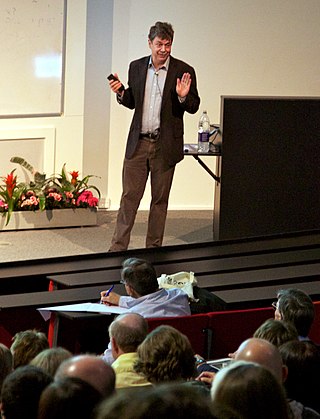
Simon David Manton White, FRS, is a British astrophysicist. He was one of directors at the Max Planck Institute for Astrophysics before his retirement in late 2019.

Harald Lesch is a German physicist, astronomer, natural philosopher, author, television presenter, professor of physics at the Ludwig Maximilian University of Munich (LMU) and professor of natural philosophy at the Munich University of Philosophy.
Rainer Mauersberger is a German astronomer. His main field of interest is observational molecular spectroscopy of the interstellar matter in galactic and extragalactic star forming regions; millimeter and sub-millimeter astronomy. He is the scientific coordinator of the International Max Planck Research School (IMPRS) for Astronomy and Astrophysics, a collaboration between the Max Planck Institute for Radio Astronomy in Bonn and the Universities of Bonn and Cologne. He teaches as a Privatdozent (lecturer) at Bonn University. He received his PhD from the University of Bonn using the Max Planck Institute for Radio Astronomy Effelsberg 100-m Radio Telescope to measure ammonia throughout the galaxy. The galactic and extragalactic cold interstellar medium remained his main field of investigation while he was working at the Sub-mm Telescope Observatory in Arizona and Pico Veleta Observatory in Granada (Spain), where he served as the station manager for nine years.
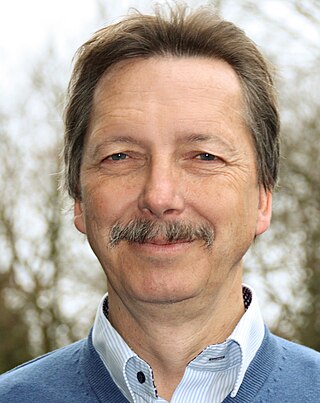
Thomas K. Henning is a German astrophysicist. Since 2001, he is a director at the Max Planck Institute for Astronomy. Henning is an expert in the field of star and planet formation.

Werner Nahm is a German theoretical physicist, with the status of professor. He has made contributions to mathematical physics and fundamental theoretical physics.
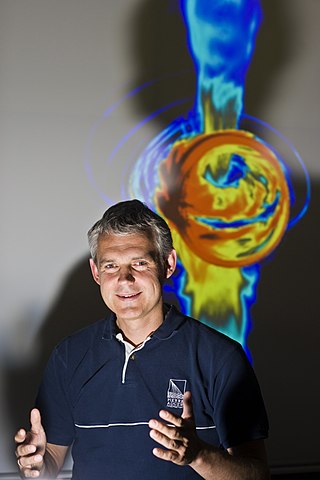
Heino Falcke is a German Dutch professor of radio astronomy and astroparticle physics at the Radboud University Nijmegen. He was a winner of the 2011 Spinoza Prize. His main field of study is black holes, and he is the originator of the concept of the 'black hole shadow'. In 2013, a team under his lead earned a 14 million euro research grant from the European Research Council to further studies of black holes. In 2019, Falcke announced the first Event Horizon Telescope results at the EHT Press Conference in Brussels.
Christine D. Wilson is a Canadian-American physicist and astronomer, currently a University Distinguished Professor at McMaster University.
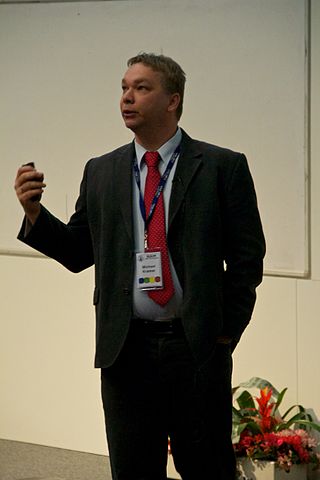
Michael Kramer is a German radio astronomer and astrophysicist. He currently serves as a Director at the Max Planck Institute for Radio Astronomy in Bonn. He is also a professor at the University of Manchester and an Honorary Professor at the University of Bonn.
John Antoniadis also known as Ioannis Antoniadis is a Greek astrophysicist. He is mostly known for his research of radio pulsars, a type of rapidly rotating neutron stars.

Johann Anton Zensus is a German radio astronomer. He is director at the Max Planck Institute for Radio Astronomy (MPIfR) and honorary professor at the University of Cologne. He is chairman of the collaboration board of the Event Horizon Telescope (EHT). The collaboration announced the first image of a black hole in April 2019.
References
- 1 2 "Norbert Bartel". yorku.ca. Retrieved January 29, 2017.
- ↑ "Bartel, Norbert". worldcat.org. Retrieved January 29, 2017.
- ↑ Bartel, Norbert. "Curriculum Vitae". www.yorku.ca. Retrieved 2018-10-19.
- ↑ "Radio Telescopes Reveal Youngest Stellar Corpse". www.nrao.edu. Retrieved 2018-10-19.
- ↑ "Youngest Black Hole Found? - Universe Today". Universe Today. 2004-06-11. Retrieved 2018-10-19.
- ↑ "Distinguished Research Professors | Provost & Vice-President Academic". vpap.info.yorku.ca. Retrieved 2018-10-19.